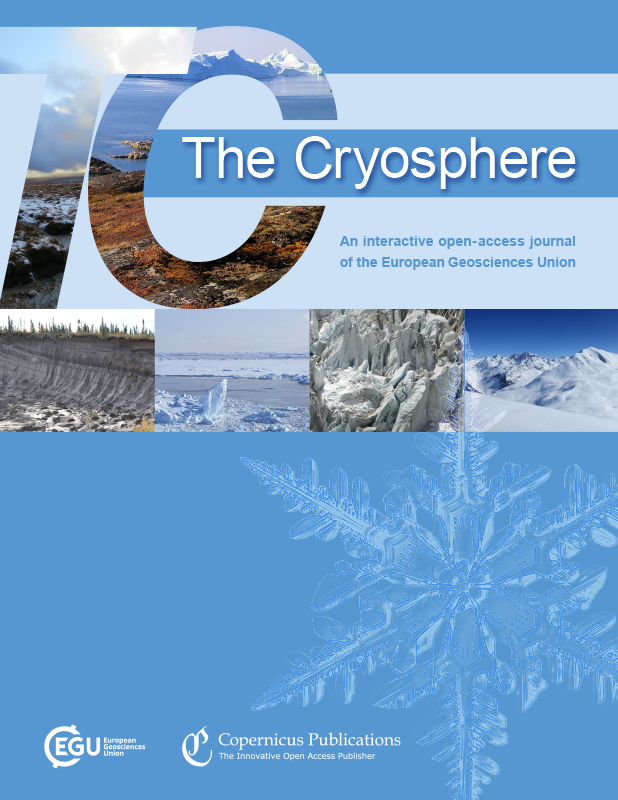Change in Antarctic ice shelf area from 2009 to 2019
IF 4.4
2区 地球科学
Q1 GEOGRAPHY, PHYSICAL
引用次数: 1
Abstract
Abstract. Antarctic ice shelves provide buttressing support to the ice sheet, stabilising the flow of grounded ice and its contribution to global sea levels. Over the past 50 years, satellite observations have shown ice shelves collapse, thin, and retreat; however, there are few measurements of the Antarctic-wide change in ice shelf area. Here, we use MODIS (Moderate Resolution Imaging Spectroradiometer) satellite data to measure the change in ice shelf calving front position and area on 34 ice shelves in Antarctica from 2009 to 2019. Over the last decade, a reduction in the area on the Antarctic Peninsula (6693 km2) and West Antarctica (5563 km2) has been outweighed by area growth in East Antarctica (3532 km2) and the large Ross and Ronne–Filchner ice shelves (14 028 km2). The largest retreat was observed on the Larsen C Ice Shelf, where 5917 km2 of ice was lost during an individual calving event in 2017, and the largest area increase was observed on Ronne Ice Shelf in East Antarctica, where a gradual advance over the past decade (535 km2 yr−1) led to a 5889 km2 area gain from 2009 to 2019. Overall, the Antarctic ice shelf area has grown by 5305 km2 since 2009, with 18 ice shelves retreating and 16 larger shelves growing in area. Our observations show that Antarctic ice shelves gained 661 Gt of ice mass over the past decade, whereas the steady-state approach would estimate substantial ice loss over the same period, demonstrating the importance of using time-variable calving flux observations to measure change.2009年至2019年南极冰架面积的变化
摘要南极冰架为冰盖提供了支撑,稳定了搁浅冰的流动及其对全球海平面的贡献。在过去的50年里,卫星观测显示冰架坍塌、变薄和退缩;然而,很少有测量到南极冰架面积的变化。在这里,我们使用MODIS(中分辨率成像光谱仪)卫星数据测量了2009年至2019年南极洲34个冰架冰架崩解前沿位置和面积的变化。在过去十年中,南极半岛的面积减少了(6693 平方公里)和南极洲西部(5563 平方公里)的面积增长超过了南极洲东部的面积增长(3532 km2)和大型Ross和Ronne–Filchner冰架(14 028 平方公里)。最大的撤退发生在拉森C冰架,5917 在2017年的一次单独的冰裂事件中,损失了km2的冰,在南极洲东部的龙尼冰架上观察到了最大的面积增加,在过去十年中,该冰架的面积逐渐增加(535 平方公里 年-1)导致5889 2009年至2019年,面积增加了km2。总的来说,南极冰架面积增加了5305 自2009年以来,面积为km2,有18个冰架退缩,16个较大的冰架在该地区生长。我们的观测表明,南极冰架增加了661 过去十年的冰质量Gt,而稳态方法将估计同一时期的大量冰损失,这表明了使用时变崩解通量观测来测量变化的重要性。
本文章由计算机程序翻译,如有差异,请以英文原文为准。
求助全文
约1分钟内获得全文
求助全文
来源期刊

Cryosphere
GEOGRAPHY, PHYSICAL-GEOSCIENCES, MULTIDISCIPLINARY
CiteScore
8.70
自引率
17.30%
发文量
240
审稿时长
4-8 weeks
期刊介绍:
The Cryosphere (TC) is a not-for-profit international scientific journal dedicated to the publication and discussion of research articles, short communications, and review papers on all aspects of frozen water and ground on Earth and on other planetary bodies.
The main subject areas are the following:
ice sheets and glaciers;
planetary ice bodies;
permafrost and seasonally frozen ground;
seasonal snow cover;
sea ice;
river and lake ice;
remote sensing, numerical modelling, in situ and laboratory studies of the above and including studies of the interaction of the cryosphere with the rest of the climate system.
 求助内容:
求助内容: 应助结果提醒方式:
应助结果提醒方式:


